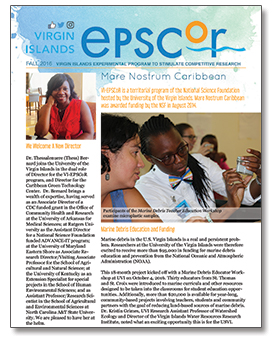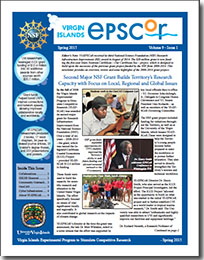VI-EPSCOR’s primary funding currently comes from its third NSF RII grant titled "Mare Nostrum Caribbean (Our Caribbean Sea): Stewardship Through Strategic Research and Workforce Development." Awarded in August of 2014, the $20 million Mare Nostrum Caribbean (MNC) grant, is being distributed in $4 million increments over five years.
Predicting climate-driven regime shifts versus rebound potential in coral reefs - (PDF-8.1MB)
- Nicholas A. J. Graham1, Simon Jennings2,3, M. Aaron MacNeil1,4, David Mouillot1,5 & Shaun K. Wilson6,7
Disturbance Driven Colony Fragmentation as a Driver of a Coral Disease Outbreak – (PDF-770KB)
Marilyn E. Brandt1*, Tyler B. Smith1, Adrienne M. S. Correa2,3,4, Rebecca Vega-Thurber2,3
Multiple mechanisms of transmission of the Caribbean coral disease white plague – (PDF – 1.1MB)
E. Clemens1, M. E. Brandt1
Environmental conditions influence tissue regeneration rates in scleractinian corals – (PDF-1.3MB)
Alexis M. Sabine a,*, Tyler B. Smith b, Dana E. Williams c, Marilyn E. Brandt b
Convergent mortality responses of Caribbean coral species to seawater warming – (PDF-1.1MB)
T. B. Smith,1, M. E. Brandt,1, J. M. Calnan,1 R. S. Nemeth,1 J. Blondeau,1,3, E. Kadison, 1, M. Taylor, 1 and P. Rothenberger2
Biogeography of transient reef-fish spawning aggregations in the Caribbean: a synthesis for future research and management – (PDF-3.3MB)
Shinichi Kobara1, William D. Heyman2 , Simon J. Pittman3,5 & Richard S. Nemeth4
Fish spawning aggregations: where well-placed management actions can yield big benefits for fisheries and conservation – (PDF-625KB)
Brad Erisman1, William Heyman2, Shinichi Kobara3, Tal Ezer4, Simon Pittman5,6, Octavio Aburto-Oropeza7 & Richard S Nemeth8



